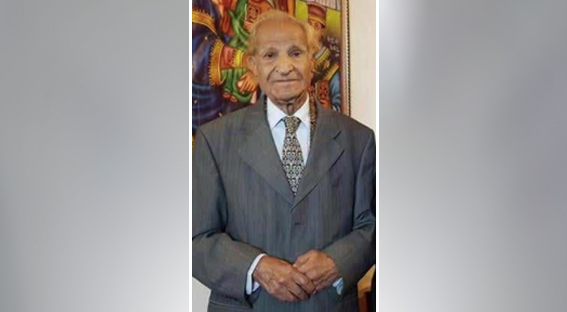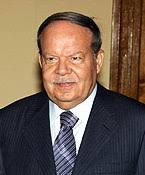On 31 August, Egypt lost one of its topmost Coptic intellectuals and prominent scholars in African affairs, Professor Antoun Yacoub Mikhail who passed away, close to 102 years of age.
Dr Mikhail was mourned by Pope Tawadros II and the Coptic Orthodox Church’s Holy Synod in a statement that described him as “an intellectual and a faithful servant of the Lord and His Church”.
Profound understanding of the world
Dr Mikhail was former Dean of the Institute of Coptic Studies (ICS) in Cairo and of the Ethiopian Holy Trinity Theological College (HTTC). His contribution to the Ethiopian and Egyptian Churches was significant on the intellectual, scientific and spiritual levels. He thoroughly knew and had meticulously researched Africa; he had spent 20 years in Ethiopia where he taught at HTTC.

Dr Mikhail was a singular intellectual and historian. In addition to his African studies, he held degrees in urban geography and in communication sciences. His works on Africa, especially Ethiopia, are widely considered invaluable references on these topics. He also had a profound understanding of world history, the global order, and international relations. He has to his name many valuable books, among them: “Constants and priorities about Egypt and its conditions”; “The Universe, People, and the World Order”; “Palestine for Whom?”; “We and Ethiopia, a Journey in Time”; “The Self and its Issues”; and “African Theologies”.

Among Dr Mikhail’s students were several notable clerics including Abune Matthias, Patriarch of the Ethiopian Orthodox Tewahedo Church, and Abune Paulos, the late Ethiopian Patriarch.
Dr Mikhail served as an important liaison between the Churches of Egypt and Ethiopia, especially after the fall of the Marxist Mengistu regime in the early 1990s, at which time he helped in the process of restoring relations between the two Churches following a rift under the socialist regime.
Services far and wide
Antoun Yacoub Mikhail was born on 20 January 1922 in the eastern Nile Delta town of Mit-Ghamr, Daqahliya. He graduated from the Coptic Orthodox Clerical College in 1941, and in 1956 got a BA in Urban Geography from Iowa University. In 1964, he earned a Master’s degree in Communication Sciences from the University of Washington, and in 1982 he got his PhD in African Studies from the Institute of Coptic Studies in Cairo.
In 1945 Dr Mikhail was invited to teach at the Selassie Theological College—today the Holy Trinity Theological College (HTTC)—a post which he retained until 1959, during which time he was also appointed assistant director. Selassie Theological College was established in 1942 by Emperor Haile Selassie originally serving as a high school. The college division was added in 1960, and the elementary education section was cancelled in 1961. The institution thereafter became one of the chartered units of the Haile Selassie I University, the first national university of Ethiopia. From 1997 till 2000, Dr Mikhail was Dean of the HTTC.

In Cairo, Dr Mikhail had established the languages programme at the Coptic Church’s Bishopric of Services in the late 1970s and into the 1980s. In 1982 and until 2009, he chaired the African Studies Department at the ICS in Cairo. From 2009 till 2010 he was Dean of the Institute.
Throughout his life, Dr Mikhail’s services spread far and wide. Together with a group of colleagues, he initiated in 1952 the first Sunday School service in Ethiopia, in Addis Ababa churches.
Upon the request of the Egyptian cultural attaché in Addis Ababa, Dr Mikhail helped establish the Egyptian cultural bureau in 1959 and worked there till 1962.
Sister Churches
This Watani reporter had the privilege of interviewing Dr Mikhail in 2018. He talked candidly, opening his heart about his precious experiences.

The Ethiopian Church and its history naturally came into focus as Dr Mikhail talked to Watani. “The Mass of the Ethiopian Church and its teachings all spring from the Coptic Church,” Dr Mikhail said. “And the Ethiopian New Year shares the same date of 11 September as the Coptic New Year; it is marked by a great celebration, and actually represents the foundation of many traditions and administrative order since early Christianity in Ethiopia.”
The story of the relation and the rift between the Coptic and Ethiopian Churches goes back in time to the 4th century when St Athanasius the Apostolic, the 20th Pope of Alexandria, consecrated Fromentius as the first Bishop of Ethiopia in 329 under the name Abune Salama. This was upon the request of the two Ethiopian Christian kings Abraha and Atsbeha.
Ethiopia thus became a bishopric under the Church of Alexandria, part of the See of St Mark. The Coptic Church continued to consecrate bishops to the seat of Ethiopia which, over the years, grew and needed wider service. The bishopric expanded into a metropolitan, and the Alexandrian Church consecrated the metropolitan and bishops to serve Ethiopia. The Ethiopian Church gained full independence from the Coptic Church in 1959. Abune Basilios was enthroned the first Patriarch of Ethiopia.
Since that time, it became the custom of the Coptic Church to appoint the heads of the Ethiopian Church. The custom ended with the overthrow of Emperor Haile Selassie in 1974. Today, the two Churches term themselves “sister Churches”.
Most notable of achievements
Among the most notable achievements for which Dr Mikhail will be remembered, was his volunteering in the peace mission between the Coptic and Ethiopian Churches in 1993, following the rift between them under the Marxist regime that ruled Ethiopia during the 1970s till 1991.

In 1991, the communist regime in Ethiopia was overthrown. Abune Paulos was elected Patriarch in 1992. As an act of proving its independence, the Ethiopian Church did not extend an invitation to the Coptic Church to participate in the enthronement of Abune Paulos.
For details of the history of the relations between the Coptic and Ethiopian Churches:
The relations between the Coptic and Ethiopian Churches, Dr Mikhail said, are old, historic relations. Yet they broke during the Marxist rule of Mengistu Haile Mariam in the 1970s, but were later restored through mediation by the Armenian Church in the 1990s once that regime came to an end.
In 1994, a protocol was signed by Pope Shenouda III of Alexandria and Abune Paulos of Ethiopia; it laid the groundwork for a good understanding between the two Churches.

Dr Mikhail told Watani the following story in the context of his continued efforts between the two sister Churches: “Patriarch Abune Paulos told me, ‘Please ask Pope Shenouda III, my mentor, to extend an invitation for me to visit him in Cairo, and I will happily oblige and settle all matters’. Abune Paulos visited the Coptic Church in 2007; I was at hand to receive and welcome him and the Ethiopian delegation. Pope Shenouda III visited Ethiopia in 2008, and again met Abune Paulos in Cairo in 2011. The two patriarchs have now departed our world, but the current patriarchs, Pope Tawadros II and Abune Matthias, have paid each other mutual visits in Cairo and Addis Ababa.”

One of a kind
Dr Mikhail talked passionately about the work he had undertaken during his time as Dean of HTTC during 1997 – 2000. “It was one college of a kind in the country,” Dr Mikhail said. “I worked on developing curricula, doubling library space, cataloguing books and periodicals, and diversifying the College’s activities by including such ventures as Christian drama. We opened the College’s doors to various Church and spiritual activities, including Sunday School, and we regained an adjacent land on which we planned to establish a clinic and a modern library,” Dr Mikahil reminisced.
Africa
In May 2013, African nations celebrated 50 years on the foundation of the Organisation of African Unity. Watani saw it as a good occasion to revisit our African roots, and what better way to do so than to review a book that had then hit the shelves, published by Dar al-Hurriya in Cairo.

The book: Africanisms by Antoun Yacoub Mikhail, covers Africa’s history, heritage, and years of colonialism; also African art, religion, magic and medicine, and tribalism. Watani wrote: “As a simplified study focusing on aspects of the rich and varied African culture and folk legacy, the value of this work goes far beyond its relatively small size.”
Watani International
4 October 2023
















